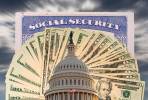Gas tax hikes
Fuel taxes are among the fairest levies imposed by government. The revenues pay for road construction and maintenance; the motorists who use those roads pay the tax. On the other hand, fewer levies have a greater impact on the cost of goods and services than fuel taxes. When fuel becomes more expensive, you pay more for everything, from food to plumbing repairs. Ultimately, everyone pays fuel taxes — even those who don’t drive.
Two bills before the Nevada Legislature would boost fuel taxes. Senate Bill 377 would more than double the state’s 17.65-cent-per-gallon tax over the next decade, increasing it by 2 cents per year until 2023, when it would reach 37.65 cents. Assembly Bill 413 would allow the Clark County Commission to increase the county’s 9-cent-per-gallon tax by indexing it to inflation — growth in the cost of road materials would trigger the tax increases, a course that could double the levy within three years.
If both bills become law, Las Vegas Valley residents could end up paying about $2.50 more per tank of gasoline by 2017. Americans already want nothing to do with $4-per-gallon gasoline. If our elected officials make fuel even more expensive, folks might be inclined to get out their torches and pitchforks — assuming they can afford to tank up their trucks and drive to a protest site.
But if there’s one thing Southern Nevadans hate more than high gasoline prices, it’s being stuck in traffic. And without more fuel tax revenue, the state and the Regional Transportation Commission of Southern Nevada won’t be able to adequately maintain our roads or add much new capacity in the years ahead. Because of the Great Recession and increasing vehicle fuel efficiency, tax collections simply aren’t growing fast enough.
Among the badly needed state projects that currently have no funding: more than $1 billion worth of work on Interstate 15, from the Las Vegas Motor Speedway to Sloan; Boulder City Bypass/Interstate 11 construction; and a full interchange at the Las Vegas Beltway and U.S. Highway 95. The RTC doesn’t have the $1 billion it needs to complete the entire beltway to full freeway standards.
Yes, the Nevada Department of Transportation ripped off Southern Nevada for decades, siphoning our fuel tax dollars to pay for rural and Reno-area projects. The elevated Reno-to-Carson City highway was one of the most wasteful, unneeded road projects in recent American history. And indexing any tax rate to inflation, as the county proposes, is high political cowardice that immunizes elected officials from criticism of increases.
That said, having well-maintained, free-flowing roads is a major quality of life and economic priority for the state. Congestion cuts into our time with family and friends, limits efficient commerce and infuriates tourists, giving them less time in our hotels. Torn-up roads cause costly car repairs.
SB 377 should be passed by the Legislature — and put to a statewide vote in 2014. AB 413 should be put on the Clark County ballot in 2014 as well — provided it drops the inflationary adjustments in favor of precise, predictable increases.
Clark County voters have supported tax increases for specific purposes. NDOT and the RTC will need to sell citizens on exactly what they’ll get for their money.























